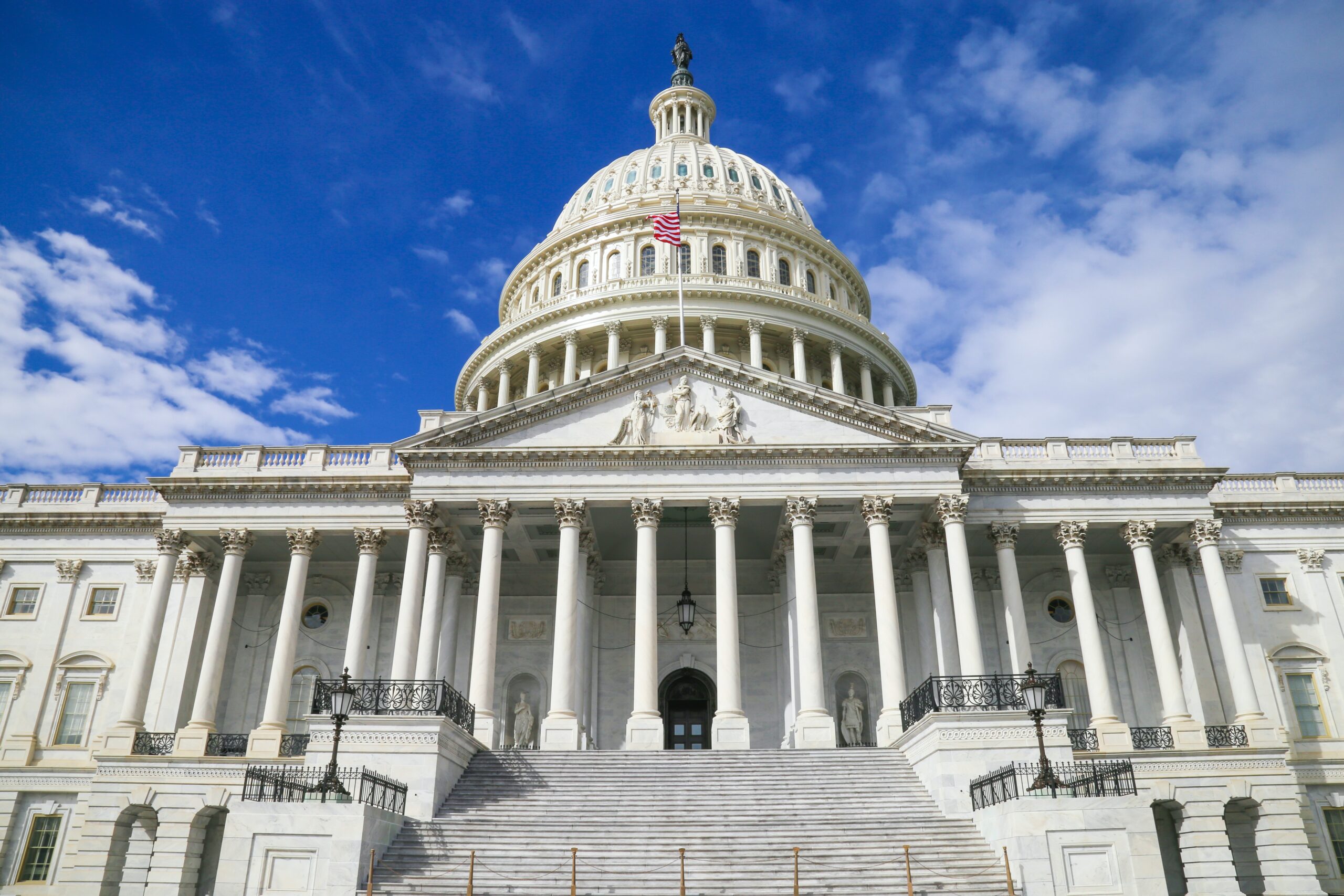
Posted October 5, 2023 at 5:58 pm EST.
The current U.S. Congress is juggling the most consequential crypto legislation yet. A new bill, proposed by Republican committee chairs Patrick McHenry and Glenn Thompson, aims to create a comprehensive framework for the roles of the CFTC and SEC in regulating digital assets.
While the bill faces an uphill battle, it is an encouraging sign that regulatory clarity may be on the horizon. All the while, a clampdown from the White House’s regulators continues despite courtroom setbacks.
Crucial to this movement in Washington are lawmakers who can affect actual policy. Leadership over relevant committees is paramount, as is the committee chair that dictates the schedule.
Rep. Patrick McHenry (R-NC)
Republican Leader @PatrickMcHenry at today’s hearing on digital assets:
“2021 was the year of the #cryptocurrency.”
Read more: https://t.co/JXM40Pu1fP
📺 Watch 👇 pic.twitter.com/DwSBvSnaPZ
— Financial Services GOP (@FinancialCmte) December 8, 2021
McHenry presides over the House Financial Services Committee, or HFSC, a role he took on after serving the past four years as minority leader under Maxine Waters (D-CA).
HFSC makes most of the House’s financial policy. It’s no surprise that its members have introduced much of the crypto legislation that’s made it into the congressional record, including early efforts like the 2018 “Token Taxonomy Act” and 2019’s “Keep Big Tech out of Finance Act.” Still, only few have made it to the committee’s calendar.
McHenry has spearheaded the major exceptions, whether that be an abortive stablecoin package alongside Waters was she remained chair, or a revamped version that has made it through the committee. The crypto industry is also enamored by his willingness to, for example, threaten to subpoena SEC Chair Gary Gensler.
The big question now is the Financial Innovation and Technology for the 21st Century Act, or FIT Act, a crypto markets bill that McHenry and allies have managed to shepherd out of committee that will soon head to the House floor.
The FIT Act may be the first bill of its size to leave the chamber. Its sponsorship, however, includes six Republicans and no Democrats — meaning, it faces a stone wall in the Democratic-led Senate.
Sen. Sherrod Brown (D-OH)
Many people think investing in cryptocurrency means big returns with zero risk.
But we’ve seen thousands of scams and spectacular blowups in the crypto markets, exposing how bad actors are costing Americans millions of dollars and putting their savings and livelihoods at risk. pic.twitter.com/K3wjzxrM5p
— Senate Banking and Housing Democrats (@SenateBanking) July 28, 2022
Brown has chaired the Senate Banking Committee since 2021 when Democrats narrowly retook the chamber.
Senate Banking remains a key sticking point for any potential crypto legislation. The committee was a roadblock against any financial policy, not having a markup for nearly four years until this June.
That markup, and more recent ones, may signify a thaw of the frozen pipes of lawmaking. But Brown continues to control the schedule and has shown no interest in picking up the crypto markets bill. His Republican counterpart, Tim Scott (R-SC), replaced Pat Toomey at the beginning of this year but largely avoids mentioning crypto in hearings.
The now-retired Toomey, for his part, has publicly predicted that there will be no motion on crypto within the Banking Committee this Congress largely due to Brown’s desire not to “legitimize” crypto.
“I don’t see a path forward in the Senate, regardless of how the vote goes in the House,” Toomey said at a recent conference at Georgetown Law School.
Sen. Debbie Stabenow (D-MI)
The recent collapse of a major cryptocurrency exchange reinforces the urgent need for greater federal oversight of this industry. Consumers continue to be harmed by the lack of transparency and accountability in this market. It is time for Congress to act.
— Sen. Debbie Stabenow (@SenStabenow) November 11, 2022
Last Congress, Stabenow led the charge for the Digital Commodity Consumer Protection Act from her position as chair of the Senate Agriculture Committee. The bill was a rare bipartisan effort from within the Senate, including the backing of Stabenow’s counterpart on the Agriculture Committee, John Boozman (R-AK).
The DCCPA represented the high-water mark for Sam Bankman-Fried’s ambitions in Washington, DC. But its momentum slowed as the fall of FTX shook the crypto industry. This year, the FTX collapse looms large over any Agriculture Committee activity.
Rep. Tom Emmer (R-MN)
Probably a good time to re-up my bipartisan Blockchain Regulatory Certainty Act.
The bill asserts that blockchain entities that never custody consumer funds are not money transmitters… providing necessary legal certainty to ensure the future of crypto reflects American values.
— Tom Emmer (@GOPMajorityWhip) December 14, 2022
Emmer was one of crypto’s first wholehearted advocates in Congress. In office since 2015, he was a founding co-chair of the Blockchain Caucus.
Republicans voted him the majority whip when they retook the House at the outset of the year, making him the third highest-ranking party member in the chamber.
As whip, his primary duty is to rustle up votes. This adds velocity to legislation he sponsors and supports.
In this congressional term, that includes bills to limit a central bank digital currency and the core authority of the SEC. Emmer is also one of five co-sponsors of the FIT Act.
Rep. Glenn “GT” Thompson (R-PA)
Today I sent a letter to @SECgov & @CFTC with my colleague @PatrickMcHenry urging the agencies to establish a joint working group on digital assets.⁰
This is an important step to ensure much-needed clarity in the industry for market participants.⁰
More👇https://t.co/8RVb3xW89X pic.twitter.com/3JqtwLPgqa— Glenn “GT” Thompson (@CongressmanGT) August 16, 2021
An early adopter of crypto markets legislation, Thompson was floating around a proposal for crypto exchanges to register with the CFTC back in 2021, inheriting a legislative bugbear from Mike Conaway (R-TX), his predecessor on the House Agriculture.
Thompson is now the formal sponsor of the FIT Act. And, like McHenry, his committee leadership finally enabled him to mark up and hold a committee vote on a package that had been in embryonic form for years.
Broadly, the Agriculture Committees are on board with guarding or expanding the authorities of the CFTC, as these, in turn, secure the committee’s jurisdiction over the new market. Ultimately, the Agriculture Committees do not hold as much power over crypto as HFSC or Banking and the fight will be to sway those leaders.
- SEO Powered Content & PR Distribution. Get Amplified Today.
- PlatoData.Network Vertical Generative Ai. Empower Yourself. Access Here.
- PlatoAiStream. Web3 Intelligence. Knowledge Amplified. Access Here.
- PlatoESG. Carbon, CleanTech, Energy, Environment, Solar, Waste Management. Access Here.
- PlatoHealth. Biotech and Clinical Trials Intelligence. Access Here.
- Source: https://unchainedcrypto.com/here-are-the-top-playmakers-in-congress-shaping-crypto-law/
- :has
- :is
- :not
- $UP
- 10
- 11
- 14
- 16
- 178
- 2015
- 2018
- 2021
- 2023
- 21st
- 28
- 500
- 58
- 8
- 9
- a
- accountability
- Act
- activity
- actors
- actual
- Adds
- advocates
- affect
- After
- against
- agencies
- agriculture
- aims
- All
- alongside
- also
- ambitions
- American
- Americans
- an
- and
- any
- ARE
- around
- AS
- Assets
- At
- Authorities
- back
- backing
- Bad
- Bank
- Banking
- Battle
- BE
- been
- Beginning
- Big
- big tech
- Bill
- Bills
- bipartisan
- blockchain
- board
- boozman
- brown
- but
- by
- Calendar
- CAN
- central
- Central Bank
- central bank digital currency
- Century
- certainty
- CFTC
- Chair
- Chamber
- charge
- clampdown
- clarity
- Co-Chair
- Collapse
- colleague
- committee
- commodity
- comprehensive
- Conference
- Congress
- Congressional
- consequential
- consumer
- Consumer Protection
- Consumers
- continue
- continues
- control
- Counterpart
- create
- crypto
- Crypto Exchanges
- Crypto Industry
- Crypto law
- crypto legislation
- Crypto Markets
- cryptocurrency
- Cryptocurrency Exchange
- Currency
- Current
- Custody
- dc
- dccpa
- Debbie
- debbie stabenow
- Democrats
- desire
- dictates
- digital
- Digital Assets
- Digital Commodity
- digital currency
- do
- dollars
- Dont
- due
- Early
- effort
- efforts
- Emmer
- enabled
- encouraging
- ensure
- entities
- establish
- Ether (ETH)
- example
- exchange
- Exchanges
- expanding
- faces
- Fall
- Federal
- federal oversight
- few
- fight
- Finally
- finance
- financial
- financial services
- First
- fit
- five
- floating
- Floor
- For
- form
- formal
- Forward
- founding
- four
- Framework
- from
- frozen
- FTX
- ftx collapse
- funds
- future
- Gary
- Gary Gensler
- Gensler
- georgetown
- Georgetown Law
- Goes
- good
- greater
- Group
- had
- harvard
- Have
- having
- he
- head
- hearing
- her
- here
- him
- his
- hold
- horizon
- House
- housing
- How
- However
- HTTPS
- i
- important
- in
- includes
- Including
- industry
- Innovation
- interest
- into
- introduced
- investing
- IT
- ITS
- John
- john boozman
- joint
- jpg
- june
- jurisdiction
- Key
- Lack
- large
- largely
- Law
- lawmakers
- leader
- leaders
- Leadership
- Leave
- Led
- Legal
- Legislation
- Legislative
- letter
- like
- LIMIT
- made
- major
- Majority
- MAKES
- Making
- managed
- mark
- Market
- Markets
- May..
- mchenry
- meaning
- means
- member
- Members
- mike
- millions
- minority
- money
- more
- most
- motion
- movement
- much
- much-needed
- my
- nearly
- necessary
- Need
- never
- New
- New Market
- no
- now
- october
- of
- Office
- on
- ONE
- only
- or
- out
- over
- Oversight
- package
- Paramount
- part
- participants
- party
- past
- pat toomey
- path
- patrick
- People
- pipes
- plato
- Plato Data Intelligence
- PlatoData
- pm
- Point
- policy
- position
- posted
- potential
- power
- predecessor
- primary
- proposal
- proposed
- protection
- providing
- Putting
- question
- RARE
- recent
- record
- reflects
- Regardless
- register
- regulating
- Regulators
- regulatory
- reinforces
- relevant
- remained
- remains
- replaced
- represented
- Republican
- Republicans
- returns
- revamped
- Risk
- Role
- roles
- s
- Said
- Sam
- Savings
- scams
- schedule
- School
- scott
- SEC
- sec chair
- secure
- see
- seen
- Senate
- Senate Agriculture Committee
- senate banking
- sent
- Services
- serving
- shaping
- she
- Sherrod Brown
- shook
- shown
- sign
- signify
- since
- SIX
- Size
- Soon
- spearheaded
- spectacular
- sponsor
- Sponsors
- sponsorship
- stabenow
- stablecoin
- Step
- sticking
- Still
- STONE
- Subpoena
- Supports
- surprise
- taxonomy
- tech
- Technology
- term
- that
- The
- The Future
- their
- There.
- These
- they
- Think
- Third
- this
- this year
- thompson
- those
- thousands
- Through
- Tim
- time
- to
- today
- tom
- Tom Emmer
- took
- toomey
- top
- Transparency
- true
- TURN
- u.s.
- u.s. congress
- Ultimately
- under
- until
- urgent
- urging
- Values
- VeloCity
- Vote
- voted
- votes
- Wall
- was
- washington
- Watch
- Waters
- when
- whether
- while
- white
- WHO
- will
- Willingness
- with
- within
- working
- Working Group
- year
- years
- yet
- youtube
- zephyrnet
- zero











